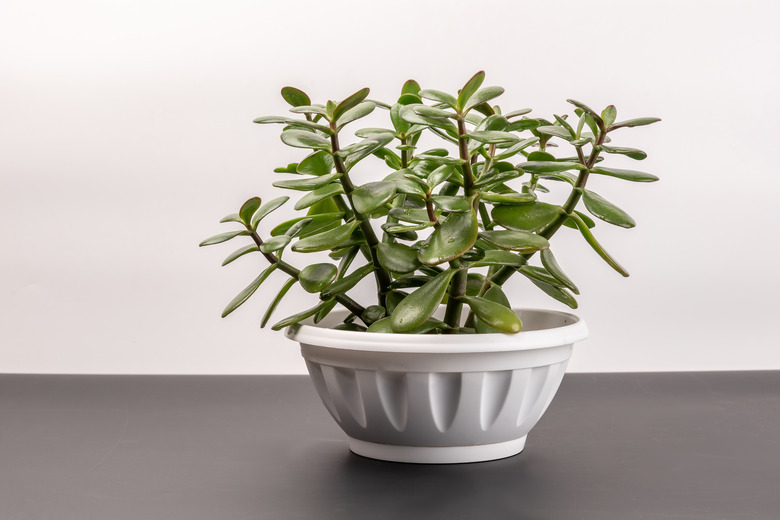Are Jade Plants Poisonous To Dogs?
We may receive a commission on purchases made from links.
The thick, fleshy, egg-shaped leaves of the jade plant (Crassula ovata, previously known as Crassula argentea) and its stocky stems and branches make it a popular houseplant. While you can grow a jade plant outdoors in warmer microclimates, it is considered hardy only in frost-free gardens in U.S. Department of Agriculture plant hardiness zones 11 and 12. Indoors or outdoors, keep your jade plants out of the reach of your pets because all parts of jade plants are poisonous to dogs, cats and horses.
Tip
Jade plants are poisonous not only to dogs but also to cats and horses. While not considered highly toxic, monitor your dog closely if it eats any part of your jade plant, especially if it begins vomiting or staggering.
About Jade Plants
About Jade Plants
Native to South Africa, jade plants can grow up to 6 feet tall and 3 feet wide under ideal conditions. As a succulent houseplant, your jade plant may grow up to 30 inches tall. When placed in full sun, the thick leaves may turn reddish around the edges and develop tiny pink to white flowers in spring.
Water when the soil is dry and avoid overwatering. The root system is small, so the plant tends to be top heavy. Use a heavy clay or ceramic pot when repotting to help weigh down the plant and prevent it from toppling when rambunctious children and dogs dash through the room.
Broken branches and leaves can be rooted by allowing the broken end to scab over for a few days and then inserting it in moist, well-drained potting soil formulated for succulents and cacti. Place the cutting and pot in bright, filtered light. Water the cutting lightly when the soil is dry.
Use caution when applying milk to your jade plant as an antifungal treatment. While spraying houseplants with milk may discourage powdery mildew and other fungal diseases, your pet may mistake a milk-covered jade plant leaf for a tasty dog treat and take a nibble or two.
Poison Severity and Symptoms
Poison Severity and Symptoms
While considered to have low toxicity, a jade plant can cause vomiting, depression, a slow heart rate and uncoordinated movements when ingested by a dog, cat or horse. Your dog may not be able to coordinate its legs and may stagger or fall down when trying to walk. Though the initial reaction may not be alarming, monitor your pet closely and consult with your veterinarian.
Dogs and Treatment Options
Dogs and Treatment Options
First, of course, remove any plant matter from the dog's mouth and wipe it with a damp cloth or rinse with water. Move the dog away from the plant, preferably into another room so it can't eat more leaves or chew on the branches.
Always contact your veterinarian immediately, even if your pet seems to be acting normally and seems unaffected by its gastric misadventure. While a jade plant is not considered highly toxic, your vet may want to monitor your dog's symptoms to ensure that it doesn't have an allergic reaction or aspirate its vomit. Do not try to induce vomiting; when inhaled, vomit can cause aspiration pneumonia.
In severe cases of poisoning or vomiting, your veterinarian will want to examine your pet. Bring part of the plant for identification when you take the dog to the vet. Dehydration is always a risk, so IV fluids may be necessary to support your dog until it stops vomiting. If symptoms continue, X-rays can determine whether your dog has developed pneumonia or if there are other unknown objects in its stomach or lungs.
